Capharnaüm
Capharnaüm (FR) – کفرناحوم – Capernaum (EN)
Capharnaüm
« Même une bouteille de ketchup a un nom », Zain n’en a pas, pas officiellement, pas d’existence, pas déclaré à la naissance. A quoi bon diront ses parents d’un air las, à quoi ça servirait ?
On sort de Capharnaüm le ventre noué, un nœud semblable à celui qui se terre dans l’estomac de Zain, ce môme dont on ne sait pas vraiment l’âge et qui n’a rien mangé depuis deux jours. Le ventre noué et la tête qui tourne. A force de tourner avec les images de Nadine Labaki autour du gosse des rues de Beyrouth dont Capharnaüm raconte l’histoire.
On est d’abord surpris. Ce film tranche nettement avec les précédents films de Labaki. Pas de poésie, d’histoire d’amour ou de drôlerie. Fini les personnages féminins qui crèvent l’écran, les montagnes du Liban ou la ville comme dans un conte. L’histoire compte peu et le réalisme brut de la vie des enfants des rues saute à la gorge.
Les images sont fortes, parce qu’elles documentent d’abord une réalité terrible et sans pitié, un univers d’enfants où plus aucune trace de l’enfance ne subsiste, sauf par moments, par la grâce d’une fête foraine décatie ou d’un personnage lugubre en costume de super-héros.
On voit bien la tentation de la réalisatrice, celle de dire, de dénoncer, de vouloir que les choses changent. Dire les enfants livrés à la rue, mais aussi les trafics, les enfants qui se vendent et s’achètent, les migrants, les réfugiés Syriens, l’absence des parents, la violence au quotidien, le mariage précoce pour se débarrasser d’un fardeau, la prison, l’injustice. Et puis surtout cette bizarrerie culturelle : pourquoi avoir des enfants lorsqu’on n’a pas les moyens de les élever ?
Comment raconter une histoire tout en restant attaché à une cause de cette force ? Capharnaüm laisse la sensation de vouloir en dire toujours plus. La réalisatrice le dit, le montage du film était une épreuve longue, choisir les images quand elles ont toutes un message fort est malaisé. Mais justement, à quoi s’attacher ? Labaki semble tellement attachée émotionnellement, face à tous ces malheurs, que nous, simples spectateurs on s’en détache presque, un peu perdus.
On voudrait excuser Labaki, Capharnaüm reste un film fort. La rue est une école de la débrouille, on est émerveillé de ce gamin sans âge, face à ces enfants qui joue leur propre rôle et qui ne sourient pas. Il n’y a pas de sourire dans ce film. Le visage fermé de Zain, sa mine butée nous hante encore longtemps après. Alors on comprend pourquoi, même si on ne croit pas au happy ending, à cette ellipse dont l’histoire ne peut se contenter, on comprend pourquoi la scène finale doit finir sur un sourire.
Il faut remercier Nadine Labaki de vouloir sortir du genre de cinéma avec lequel elle nous a conquis. Même si on trouve à redire, il faut dire à la réalisatrice toute l’admiration que l’on a pour son travail, reconnaitre sa détermination pour produire un film de ce genre au Liban. Et que l’on sent profondément son attachement pour son pays et son envie de changer les choses.
Capharnaüm, un film de Nadine Labaki, Liban 2017 – Prix du Jury, festival de Cannes 2018
کفرناحوم
« حتى علبة الكاتشاب تحمل إسماً » ولكن زين لا يحمل إسماً، ليس لديه إسم بصورة رسمية، لا يحمل أي إسم، لم يعلن له عن إسم عند ولادته. وكان تعليق والديه على ذلك بضجر لماذا يجب أن نعطيه إسم؟ فيما سوف يفيده حمل إسم؟
عندما خرجنا من صالة عرض فيلم كفرناخوم أحسست أن بطني معقودة، وكأن هذه العقدة تشبه تلك التي بداخل زين، ذاك الصبي الذي لا نعرف عمره الحقيقي، ذاك الصبي الذي لم يلامس لسانه طعاماً منذ يومين. كانت بطني معقودة والدنيا تدور حول رأسي. كانت تدور بشدة بسبب صور نادين لبكي حول ذاك الطفل الذي يحوم شوارع بيروت والذي يحكي قصته فيلم كفرناخوم.
قد أدهشنا هذا الفيلم بشدة حيث لا يتماشى أبدا مع أفلام نادين لبكي السابقة. ليس فيه شِعر ولا قصة حب ولا قصة كوميدية. لا يوجد فيه شخصية إمراة تخرق الشاشة ولا يوجد فيه جبال لبنان ولا مدينة كما في قصص الخيال. مكانة القصة ليست كبيرة ولكن بالفيلم واقعية عن حياة أطفال الشوارع تقفز إلى حلقك وتخنقك.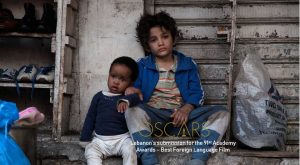
كان الفيلم مليئاً بالصور القوية التي توثق لحقيقة مريعة وقاسية، عن عالم أطفال لا يوجد في حياتهم أثر للطفولة إلا بعض اللحظات القليلة التي تأتي بفضل الملاهي أو بفضل شخصية كئيبة متنكرة في زي بطل الأبطال.
نرى بصورة واضحة في هذا الفيلم محاولة المخرجة الحديث عن الحقائق ومحاولة شجبها وتغييرها. تحاول المخرجة أن تعكس صورة أطفال الشوارع وكذلك التجارة غير المشروعة والأطفال الذين يشترون ويبيعون والمهاجرين واللاجئين السوريين وغياب الوالدين والعنف اليومي والزواج المبكر للتخلص من عبء أحد الأطفال والسجن والظلم. ولكن كانت أهم تلك الصور هي الحديث عن تلك الثقافة الغريبة جداً: لماذا ننجب أطفالاً إذا لم يكن لدينا مصدر رزق نربيهم به؟
كيف يمكن أن نحكي قصة ونظل مرتبطين بقضية بهذه القوة؟ يترك فيلم كفرناخوم لديك رغبة بالحديث عنه أكثر فأكثر. وقد قالت المخرجة أن انتاج هذا الفيلم كان امتحانا طويلاً فلم يكن الاختيار بين كل تلك الصور التي تحمل رسالة قوية سهلاً على الإطلاق. ولكن ما الذي يجب التركيز عليه بالضبط؟ يبدو أن نادين لبكي مرتبطة عاطفياً بهذه الحقائق وذلك في وجه كل هذه الأحزان التي تبدو بعيدة عنا نحن المشاهدين العاديين لأننا ضائعين عنها.
نحاول أن نعذر نادين لبكي، التي أخرجت فيلماً قوياً مثل كفرناخوم. حيث يظل الشارع هو المدرسة التي نتعلم فيها كيفية التصرف، ونندهش بهذا الطفل الذي لا نعرف عمره وهؤلاء الأطفال الذين يلعبون أدوارهم دون أن ترتسم ابتسامة واحدة في وجوههم. لا يوجد ولا ابتسامة واحدة في هذا الفيلم. فقد حمل زين وجهاً جاداً ويظل وجهه الصامد يحوم في ذاكرتك لأوقات طويلة بعد خروجك من صالة العرض. وبالرغم من أن لا أحد يصدق بوجود النهاية السعيدة وذلك الجزء الناقص الذي لا يمكن أن تنتهي عليه أي قصة، ولكن نتفهم سبب انتهاء المشهد الأخير بابتسامة.
يجب أن نشكر نادين لبكي التي أرادت أن تخرج عن نوع السينما الذي غزت به شاشاتنا لعقود. بالرغم من أننا نود أن نقول ونعيد رغبتنا في أن نوصل لهذه المخرجة أعجابنا الكبير بعملها وتيقننا بعزيمتها الكبيرة بإنتاج فيلم من هذا النوع في لبنان. ونحس بعمق ارتباطها بوطنها ورغبتها في تغيير الأشياء.
Capernaum
« Even a bottle of ketchup has a name, » Zain has none, not officially, no existence, not declared at birth. What for, will say his parents with a weary look, what would it be useful for?
We leave Capernaum with a knotted belly, a knot similar to the one that is buried in Zain’s stomach, this kid whose age we do not really know and who has eaten nothing for two days. Knotted belly and spinning head. By dint of turning with the images of Nadine Labaki around the kid of the streets of Beirut which Capernaum tells the story.
We are surprised at first. This film contrasts sharply with previous Labaki’s films. No poetry, love story or fun. No female characters who steal the screen, no mountains of Lebanon or the city as in a tale. The story counts for little and the raw realism of the life of the street children leaps to the throat.
Images are strong, because they foremost document a terrible and pitiless reality, a universe of children where no trace of childhood remains, except at times, by the grace of a 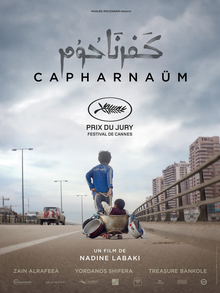 decadent funfair or a lugubrious character in superhero costume.
decadent funfair or a lugubrious character in superhero costume.
We can see the temptation of the director to tell, to denounce, to want things to change. Tell about the children alone in the streets, but also the trafficking, kids sold and bought, migrants, Syrian refugees, absence of parents, violence in everyday life, early marriage to get rid of a burden, prison, injustice. And especially this cultural quirk: why having children when one cannot afford to raise them?
How to tell a story while remaining committed to a cause of this force? Capernaum leaves the feeling of something that always want to say more. The director says it, the editing of the film was a long ordeal, choosing the images when they all have a strong message is difficult. But precisely what to focus on? Labaki seems so emotionally attached, in the face of all these misfortunes, that we, mere spectators, are almost detached, a little lost.
We would like to excuse Labaki, Capernaum remains a strong film. The street is a school of coping, this child without age, facing these children who plays their own role and who do not smile, amazes us. There is no smile in this film. The closed face of Zain, his stubborn mine haunts us a long time after. So we understand why, even if we do not believe in the happy ending, this ellipse which doesn’t honor the story, we understand why the final scene must end on a smile.
We must thank Nadine Labaki for leaving the kind of cinema with which she conquered us. Even if we find defaults, we must tell the director all the admiration we have for her work, recognize her determination to produce a film of this kind in Lebanon. And that we deeply feel her attachment to her country and her desire to change things.
Capharnaüm, a film by Nadine Labaki, Lebanon 2017 – Jury Prize, Cannes Festival 2018

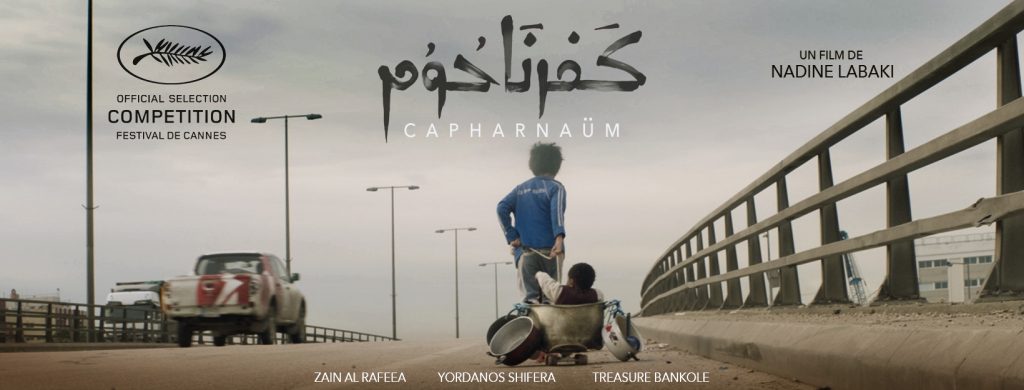
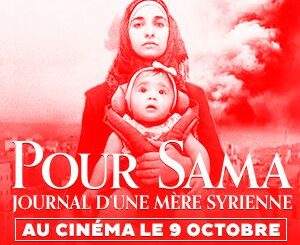
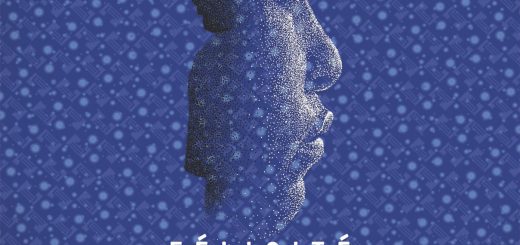
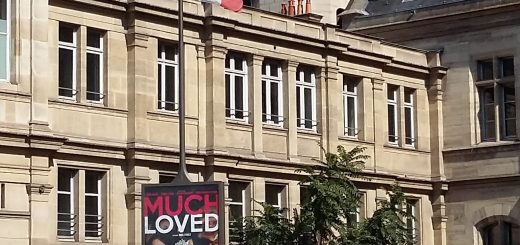








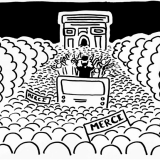


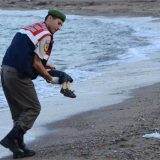

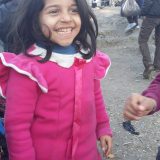


Hey! Someone in my Facebook group shared this site with us so I came to look it over. I’m definitely enjoying the information. I’m bookmarking and will be tweeting this to my followers! Wonderful blog and brilliant design and style.